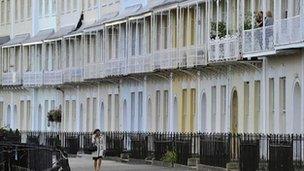House prices fell 1% in March, says Nationwide
- Published
House prices were pushed lower than a year ago for the first time in six months after a 1% dip in March compared with February, the Nationwide said.
The price of an average home was down 0.9% compared with a year earlier, at £163,327, the building society said.
This was the biggest annual fall since June 2011.
Nationwide said that the slowdown was to be expected owing to changes in stamp duty rules creating a "headwind" in an already difficult environment.
"In our view the challenging economic backdrop is likely to continue to act as a drag, with house prices moving sideways or modestly lower over the next 12 months," said Robert Gardner, Nationwide's chief economist.
Stamp duty
First-time buyers must now join others in paying at least 1% tax on properties worth more than £125,000, after a two-year "stamp duty holiday" came to an end on Saturday.
The Nationwide figures are based on the lender's own mortgage data. Sales were unlikely to be completed before the concession ended for any mortgages approved in March. So the slowdown was expected to be seen in this month's figures.
Figures from the Bank of England, also published on Thursday, showed that the pick-up in mortgage approvals seen in January did not last into February.
There were 48,986 home loans approved for house purchases during the month, down 15% on the number in January.
Nationwide said it was difficult to calculate the effect on the market, as it was not known how many sales would otherwise have taken place.
The lender suggested that 65% of first-time buyers would pay stamp duty in the coming year. For an estimated 100,000 buyers, that would add an average of about £1,800 to the purchase price of a home costing between £125,000 and £250,000.
In his Budget last week, Chancellor George Osborne announced a new 7% stamp duty threshold on properties sold for more than £2m.
Regional picture
Nationwide also suggested that prices dipped in all but three regions of the UK in the first three months of the year compared with the previous quarter.

There were differences in price changes in different areas of the country
The only rises were seen in the north of England, Scotland, and Greater London.
The biggest rise was in the north of England, up 0.6%, with the sharpest fall in Wales, down 3.1%.
On an annual basis, London saw the quickest house price growth, up 2.3%, with prices falling the most in Northern Ireland, down 8.6%.
However, Ashley Alexander, director of estate agent review website MeetMyAgent.co.uk, said: "House price indices are based on such a small number of sales at the moment that it is difficult to say with any degree of confidence that they provide a realistic measure of market conditions."